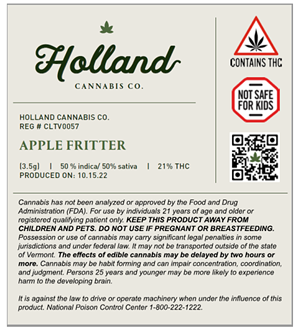
- Urospoteko | Dreamstime
- Cannabis
The Vermont Cannabis Control Board first learned of the bad batch last week, when a consumer complained of headaches and nausea after smoking weed grown by Holland Cannabis. Testing of the product turned up myclobutanil, the active ingredient found in Eagle 20EW fungicide, a legal product that is banned from use on cannabis in Vermont.
The fungicide is commonly used by growers in the illicit market, according to Cannabis Control Board chair James Pepper. While Vermont's regulated market allows for the use of some pesticides, Eagle 20EW is banned, Pepper said.
Five different strains tested positive for the fungicide, Pepper said, but Holland Cannabis had more for sale.
"We're just going to have to destroy it all," Pepper said.
"We're just going to have to destroy it all," Pepper said.
The grower could lose his license and face fines.
"We're in the midst of an investigation and getting the facts straight with the cultivator," Pepper said.

- Courtesy
- A label for Holland Cannabis' "Apple Fritter" strain
How the tainted product made it onto the shelves is a question for regulators. Holland Cannabis had applied to register the products in question, but the control board had yet to approve them all, Pepper said, meaning they shouldn't have been available for sale. Lab paperwork that Holland Cannabis provided the board came back "clean," which could mean the results were falsified or the result of "some very selective sampling," Pepper said.
"This is part of the investigation," Pepper said. "So we're still piecing this together."
Holland Cannabis is registered to Matthew Morin, who has a "tier 2" cultivator license. That allows him to grow 2,500 feet of cannabis canopy both indoors and out.
Reached by phone on Thursday, Morin declined to comment and directed a reporter to his attorney, Brice C. Simon of Breton & Simon in Stowe.
Simon said his client has never used the pesticide in question and pointed to the clean tests Morin got back from an independent lab.
"We just don't know if these are false positives or if there are other mix-ups or problems with the testing regime," Simon said of the state's results.
Asked about the person who reported getting sick after using Holland Cannabis, Simon said he didn't have many details about the situation, including the "chain of custody" of the product once it left his client's possession.
Asked about the person who reported getting sick after using Holland Cannabis, Simon said he didn't have many details about the situation, including the "chain of custody" of the product once it left his client's possession.
"I understand that there's concern, and my client is also concerned and supports the board taking whatever action it needs to take to protect the public," Simon added. "But there's many other possible explanations for what's happened here. And it's just going to take additional time and resources and investigation to figure out what actually occurred."
Anyone who purchased Holland Cannabis should return it to the store where they bought it. The board encourages anyone who used the cannabis and became sick to seek medical attention or call poison control, as well as file a complaint with the board. Symptoms of inhaling the pesticide are relatively mild and can include rash, headache, diarrhea, abdominal pain, vomiting, nosebleed and eye irritation.
"Using an unauthorized pesticide is our second-highest penalty," Pepper said. "But if they were untruthful to the board about it at all, including submitting a falsified report, or not sampling properly in order to provide a falsified report, then that's our biggest penalty, which is immediate suspension, revocation and potential for fines."
"Using an unauthorized pesticide is our second-highest penalty," Pepper said. "But if they were untruthful to the board about it at all, including submitting a falsified report, or not sampling properly in order to provide a falsified report, then that's our biggest penalty, which is immediate suspension, revocation and potential for fines."












Comments
Comments are closed.
From 2014-2020, Seven Days allowed readers to comment on all stories posted on our website. While we've appreciated the suggestions and insights, right now Seven Days is prioritizing our core mission — producing high-quality, responsible local journalism — over moderating online debates between readers.
To criticize, correct or praise our reporting, please send us a letter to the editor or send us a tip. We’ll check it out and report the results.
Online comments may return when we have better tech tools for managing them. Thanks for reading.